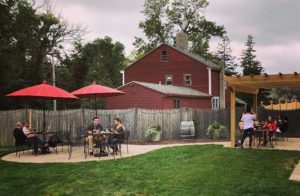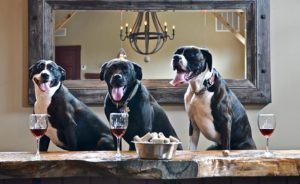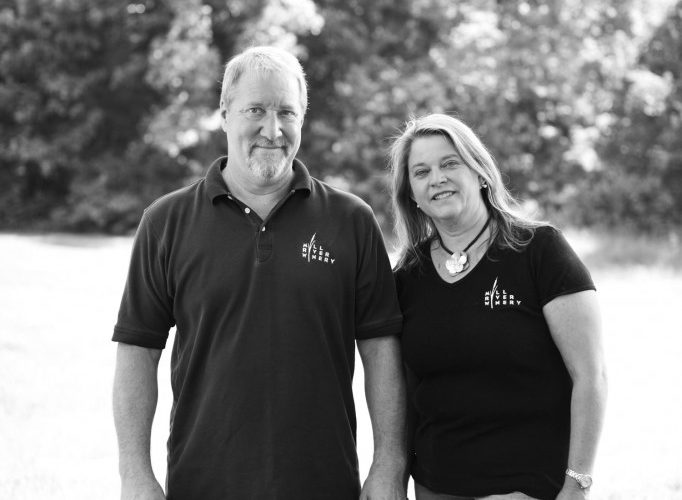At the Mill River Winery in Rowley, owners Rick Rousseau and Donna Martin, along with their staff, bring together skill, persistence, and plenty of passion, resulting in an intoxicating blend that’s just right. By Debbie Strong
Nestled along route 1 in Rowley, at the corner of Wethersfield Street, sits the charming Mill River Winery. The winery’s rustic main building is set on 3.3 acres of picturesque, quiet land, but inside you’ll find a bustling wine-making operation, along with a friendly and knowledgeable staff eager to share their expertly crafted wines made right on the premises.
Winery Hours
Wednesday & Thursday: 1-7pm
Friday: 12-7pm
Saturday: 12-6pm
Sunday: 12-5pm

Source: Instagram @millriverwinery
The Location
Opened in summer of 2011 by co-owners Donna Martin and Rick Rousseau, the winery, named for the nearby Mill River, sits on the abandoned property of what was once an 1800s cider mill. The mill’s main building has been restored to an elegant tasting room, and there’s also a working farm winery, a vineyard, and an orchard, along with a wine and gift shop. Grapes are brought in locally from throughout Massachusetts but also sourced from the best wine regions in the country and even the world, such as California and Chile. As a result, says Martin, “We’re able to take advantage of both hemispheres of the globe and therefore two harvest seasons.”
“We can also blend the grapes we grow with the ones we source, thus putting a New England spin on a California or Chilean grape, for example,” adds Steve Tudal, the assistant winemaker who has been with Martin and Rousseau since before they opened. Sold in bottles, cases, or flights of five tastes, the winery’s selection includes an award-winning Naked Chardonnay plus many more distinctive reds and whites, all housed under three main brands: Plum Island, Mill River, and Mill River Select.
A Modest Beginning
The story of how the winery came to be begins about half a dozen years ago. Martin earned a PhD in chemistry; she first worked as a college chemistry professor and later in various research and product development roles at corporations. Rousseau’s background was in painting and contract work, but he pursued his hobby of amateur winemaking on the side. After Martin, who lives in Wenham, hired Rousseau to do some work on her house, the two struck up a friendship-and, soon after, a romance. By 2006, the two were dating, and Rousseau also began sharing his homemade wines with Martin.
“I tasted a lot of Rick’s wines, and they were wonderful,” says Martin. Taking what she knew about science and chemistry, Martin would think of ways to tweak and improve the taste. “I began offering small suggestions here and there, and the wines started to get even better.” The pair were soon creating batches of wine together, and their operation slowly grew more sophisticated, with Rousseau developing a tasting lab for Martin in his basement in Rowley. “We started entering amateur winemaking competitions and winning medals,” recalls Rousseau.
“We should do this”
It was around this point that Martin says she had reached something of a crossroads in her life. Her kids were getting older, and she was tired of putting in 70-plus-hour work weeks and of sitting in traffic on Route 128. Winemaking was something Martin loved, and she thought it might be time to dial back her career and try winemaking full time. Rousseau was on board with this plan.
“There was one day when I just had this epiphany,” says Martin. “I thought, ‘We should do this.'” Analytical by nature, she right away began applying a scientific-like approach to figuring out what they needed to do to get a successful winery off the ground. Eventually, armed with an impressive business plan, Martin pedaled their idea around to area banks and found that her exhaustive market research had paid off; she managed to secure necessary funding despite the crumbling economy of 2008. In 2010, she and Rousseau purchased the abandoned mill property in Rowley.
The Building
“The building was intended to be demolished before we purchased the property,” says Martin, adding that Rousseau saw something special in it and wanted to “save” the building and restore as much as possible of the late-1800s cider mill. “Rick made everybody take the nails out and save every piece of old wood. He wanted to reclaim the wood archway, the walls, the beams. He had a vision of how he wanted to incorporate the old with the new and bring the building back to life.” The original wood beams are still visible atop the high-ceilinged building, which has been transformed into a sophisticated tasting room and gift shop complete with leather seating, modern light fixtures, and other items that Martin says were all painstakingly handpicked to fit in with their “roughly sleek” decor.
At the back of the building is the manufacturing room, complete with a grape-sorting table, a cement “crush pad,” several vast stainless steel tanks imported from Italy that help control the temperature during fermentation (the chemical conversion of sugars into ethanol), and authentic French oak barrels for storage. There’s even an impressive state-of-the-art bottling machine with an air vacuum and conveyor belt, which bottles and labels the wines efficiently and is atypical of most small farm wineries. The operation is led by Rousseau, but there’s plenty of input from the rest of the staff, not to mention Martin’s scientific insight, as the wines are slowly handcrafted to peak taste.
Perfection Takes Time
“What’s so amazing is that [Donna and Rick] aren’t in a rush to meet any deadlines,” says assistant winemaker Tudal. “They take time to analyze and perfect the pH levels, the sweetness, the oakiness. The process is a lot more in-depth than most wineries of this size, or even larger.”
Outside, the couple and their staff have begun planting grapevines in the center of the outdoor property, as well as-in a nod to the property’s origins-a variety of apple trees along the perimeter, including Pink Lady, Honey Crisp, McIntosh, and Golden Delicious varieties. “The start of a new apple orchard was also part of trying to reclaim as much character of the old cider mill as possible,” says Martin. “It will take a couple of years before the apples are ready to pick and sell. We may even make cider.” They’re also now in the process of constructing a “vineyard walk,” a pathway where visitors will be able to stroll around the perimeter of the vineyard, relax on benches, or have a picnic in the shade of the orchard.

Credit Instagram: @millriverwinery
The Old With The New
As much as Mill River Winery’s owners are striving to honor the past, they’re simultaneously diving headfirst into the future, embracing the digital, smartphone-obsessed culture we live in today. As they were still renovating the winery last year, Martin set up a Facebook page and hung a sign out front that read “Facebook Mill River Winery.” In a short time, it garnered nearly 500 “likes” just from drive-by traffic, plus a bit of local buzz.
“Ultimately, we want people to know that we are a winery with a personality, and social media really helps us accomplish that,” says Chris Johnston, the winery’s director of marketing and communications, who was brought on board in part to help expand the businesses’ social media presence. (Besides Martin and Rousseau, the winery has about half a dozen part-time employees.) In addition to Facebook, they’ll utilize Twitter, host a text club to give away exclusive discounts to members, and publish a monthly blog.
“The ‘millennial’ generation-those in their early to late 20s-are a fast-growing segment of the wine market. The young people in this group know a lot about wine. They’re very knowledgeable and enthusiastic,” says Martin, who notes that they’ve been lucky so far to start off with a strong base of local customers, many of whom were simply curious area residents who happened to drive by a few times and decided to come in. “Massachusetts has a huge wine-drinking population-we’re fifth or sixth in the country in terms of wine consumption-but there aren’t a lot of places to buy locally crafted wines.”
Now that wines can legally be poured at farmers’ markets in Massachusetts, Mill River Winery will also have a regular presence at several regional farmers’ markets this summer, including those in Newburyport, Salem, Wayland, Somerville, and Acton/Boxborough.
Events for All
In addition to hosting occasional wine-tasting evenings and events, Mill River Winery is available for private functions, such as bridal showers, rehearsal dinners, book clubs, charity functions, or parties, both formal and informal. Packages include tours, appetizer spreads, and, of course, plenty of red and white wine. The winery has even begun partnering with local food makers, such as third-generation Italian cheesemaker Luca Mignogna of nearby Wolf Meadow Farm in Rowley, who hand selects cheeses to pair with the wines and whose picks are available to taste or to purchase.
Feedback about events thus far has been overwhelmingly positive, says Anne Semple, a self-professed wine geek who acts as Mill River Winery’s sales and events manager. “The initial feeling when people first walk in for an event has been, ‘Who knew this was here?!’ and, ‘This reminds me of a California winery’s tasting room,'” she says. There are also plans to start a wine club, where members will receive and learn about a new wine each month and be privy to special discounts and events.
Accessibility
“We are a winery that’s accessible to beginner wine drinkers, experienced wine drinkers, and everyone in between,” says Johnston. Whenever the winery is open, the tasting room is also open, and anyone who walks through the door is invited to relax, taste the wines, and learn about how they were made. “We want people to come and grow with us,” Johnston says. millriverwines.com.

